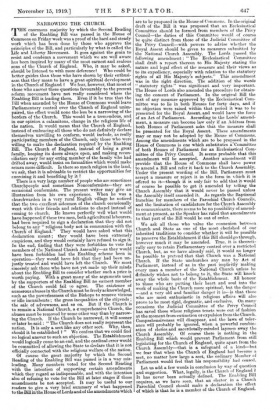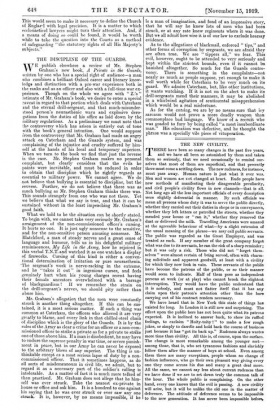NARROWING THE CHURCH. T HE enormous majority by which the Second
Reading of the Enabling Bill was passed in the House of Commons on Friday week was a proof of the hard and steady work which has been done by those who approve the principles of the Bill, and particularly by what is called the Life and Liberty Movement. It goes against the grain to resist and condemn a movement which we are well aware has been inspired by many of the most earnest and zealous ions of the Church of England. Who, it may be asked, should be listened to with more deference? Who could be better guides than those who have shown by their enthusi- asm that they mean to have a great spiritual development in the Church of England ? We fear, however, that most of those who answer these questions favourably to the present reform movement have not really considered where the Enabling Bill is leading them. Even if it be true that the Bill when amended by the House of Commons would leave Parliamentary control over the Church of England unim- paired, the effect would none the less be a narrowing of the borders of the Church. This would be a tremendous, and in our opinion a calamitous, change in the religious life of the nation. It would mean that the Church of. England, instead of embracing all those who do not definitely declare themselves unwilling to conform, would include, as really participating members of the Church, only those who were willing to make the declaration required by the Enabling Bill. The Church of England, instead of being a great family, keeping its doors always open, and making recon- ciliation easy for any erring member of the family who had drifted away, would insist on formalities which would make return more difficult. Is there so much religion in the land, we ask, that it is advisable to restrict the opportunities for exercising it and benefiting by it ?
There is a very large number of people who are sometimes Churchpeople and. sometimes Nonconformists—they are occasional conformists. The present writer may give an illustration from his own experience. When he was a churchwarden in a very rural English village he noticed that the two excellent sidesmen of the church occasionally went with their friends and relations to chapel instead of coming to church. He knows perfectly well what would have happened if these two men, both agricultural labourers, had been required to sign a declaration that they did not belong to any "religious body not in communion with the Church' of England. They would have asked what this declaration meant ; they would have been extremely suspicious, and they would certainly have refused to sign it. In the end, finding that they were forbidden to vote for members of the National Church Assembly—as they would have been forbidden had the Enabling scheme been in operation—they would have felt that they had been un- justly treated and would have left the Church. We most sincerely ask those who have not yet made up their minds about the Enabling Bill to consider whether such a price is worth paying. With a great many of the arguments used by the supporters of the Enabling Bill no earnest member of the Church could fail i o agree. The existence of numerous abuses in the Church must be freely acknowledged, such as the powerlessness of the Bishops to remove vicious or idle incumbents ; the gross inequalities of the stipends ; the sale of advowsons, and so on. But if the Church is to remain a National Church, a comprehensive Church, the abuses must be removed by some other way than by narrow- ing the Church. If the Church be narrowed, it will sooner or later be said : "The Church does not really represent the nation. It is only a sect like any other sect. Why, then, should it be established ? " We confess that we could find no logical answer to such an objection. The Establishment would logically come to an end, and the cardinal error would be committed of allowing the State to declare that it is not officially connected with the religious welfare of the nation. Of course the great majority by which the Second Reading of the Enabling Bill was passed is in a way mis- leading. Many members voted for the Second Reading with the intention of supporting certain amendments which they regard as indispensable, and with the intention also of refusing to vote for the Bill at later stages if those amendments be not accepted. It may be useful to our readers to give a very brief summary of what happened to the /Min the House of Lords and of the amendments which are to be proposed in the House of Commons. In the original draft of the Bill it was proposed that an Ecclesiastical Committee should be formed from members of the Privy Council—the duties of this Committee would of course be quite distinct from those of the Judicial Committee of the Privy Council—with powers to advise whether the Royal Assent should be given to measures submitted by the National Church Assembly. The Lords passed the following amendment : "The Ecclesiastical Committee shall draft a report thereon to His Majesty stating the nature and legal effect of the measure and their views as to its expediency, especially with relation to the statutory rights of all His Majesty's subjects." This amendment was in the right direction. The addition of the words "statutory rights" was significant and very important. The House of Lords also amended the procedure for obtain- ing the consent of Parliament. In the original Bill the text of any measure approved by the Ecclesiastical Com- mittee was to lie in both Houses for forty days, and if no objection were raised within that period it was to be presented for the Royal Assent, and would have the force of an Act of Parliament. According to the Lords' amend- ment, a measure can become law only if an Address from both Houses of Parliament asks that the measure shall be presented for the Royal Assent. These amendments may or may not be adopted by the House of Commons. Among the amendments which are to be proposed in the House of Commons is one which substitutes a*Committee of both Houses of Parliament for an Ecclesiastical Com- mittee of the Privy Council. It seems probable that this amendment will be accepted. Another amendment will provide that the House of Commons shall have power to amend a Bill and refer it back to the Church Assembly. Under the present wording of the Bill, Parliament must accept a measure or reject it in the form in which it is offered to it—though it is only fair to add that it would of course be possible to get it amended by telling the Church Assembly that it would never be passed unless the Assembly itself amended it. As regards the Baptismal franchise for members of the Parochial Church Councils, and the limitation of candidature for the Church Assembly to communicants, there seems to be no possibility of amend- ment at present, as the Speaker has ruled that amendments to that part of the Bill would be out of order.
We ask all those who value the connexion between Church and State as one of the most cherished of our inherited traditions to consider whether it will be possible to preserve the Establishment if this Bill should go through, however much it may be amended. True, it is theoreti- cally easy to retain Parliamentary control over a restricted Church, but, as we have already said, it would no longer be possible to pretend that that Church was a National Church. If the State unchurches any man by Act of Parliament, instead of as in the past implicitly making every man a member of the National Church unless he definitely wishes not to belong to it, the State will knock away the whole basis of the Establishment. All honour to those who are putting their heart and soul into the work of making the Church more spiritual, but the danger —and a very old and familiar danger it is—is that those who are most enthusiastic in religious affairs will also prove to be most rigid, dogmatic, and exclusive. On many occasions the Judicial Committee of the Privy Council has saved those whose religious tenets were out of fashion at the moment from extinction or expulsion from the Church. Comprehensiveness will disappear, and the laws of toler- ance will probably be ignored, when a powerful combin- ation of clerics and sacerdotally-minded laymen sway the Church Assembly. Of course there is nothing in the Enabling Bill which would prevent Parliament from still legislating for the Church of England, quite apart from the Church Assembly—that is a safeguard of a kind—but we fear that when the Church of England had become a sect, no matter how large a sect, the ordinary Member of Parliament would feel that his responsibility had ceased.
Let us add a few words in conclusion by way of question and suggestion. What, legally, is the Church of England ? It has never been actually defined. The Enabling Bill requires, as we have seen, that an elector. m a Church Parochial Council should make a declaration the effect of which is that he is a member of the Church of England. This would seem to make it necessary to define the Church of Englard with legal precision. It is a matter to which ecclesiastical lawyers might turn their attention. And, if a means of doing so could be found, it would be worth while to take the question into the Courts as a method of safeguarding "the statutory rights of all His Majesty's subjects."







































 Previous page
Previous page